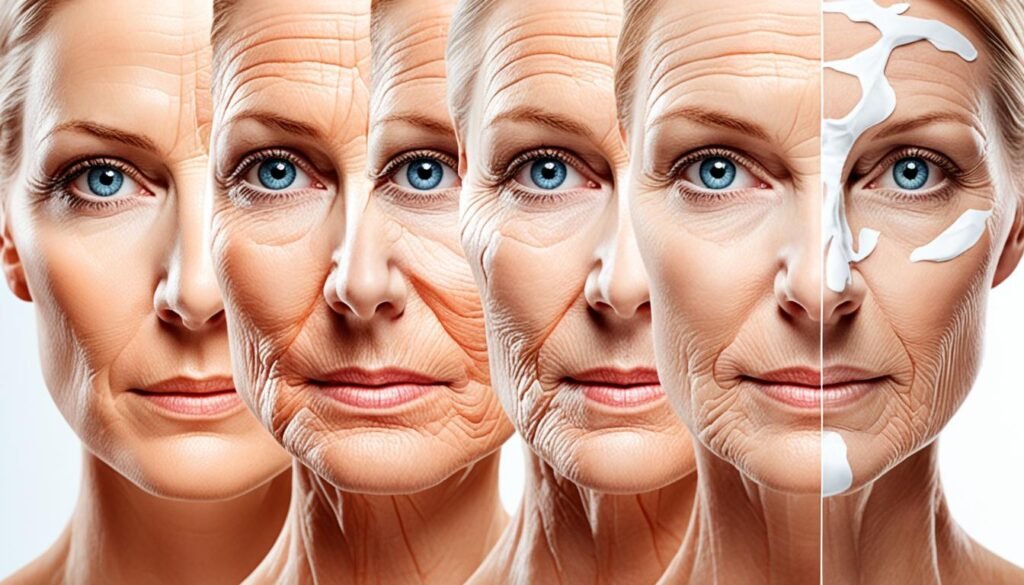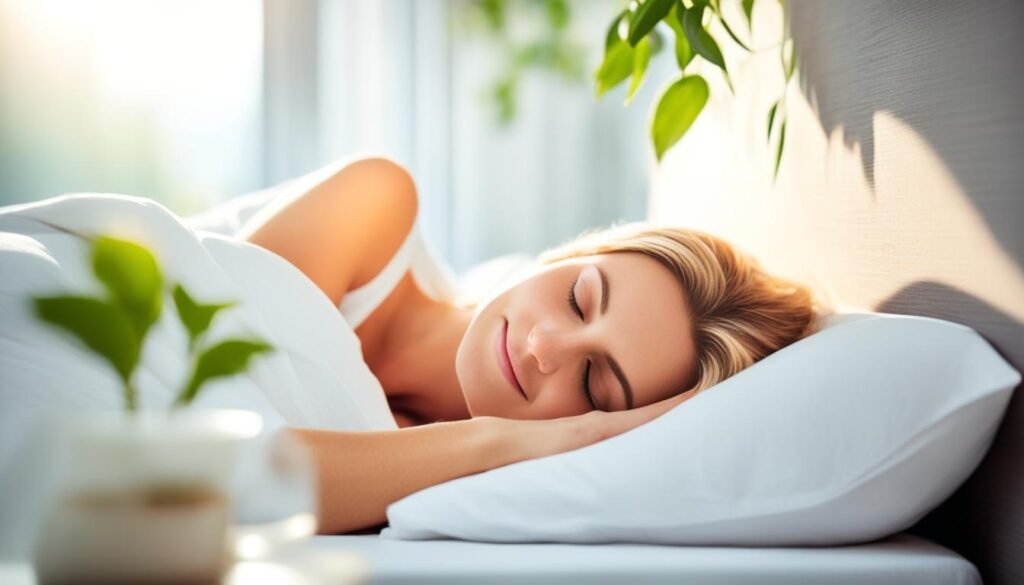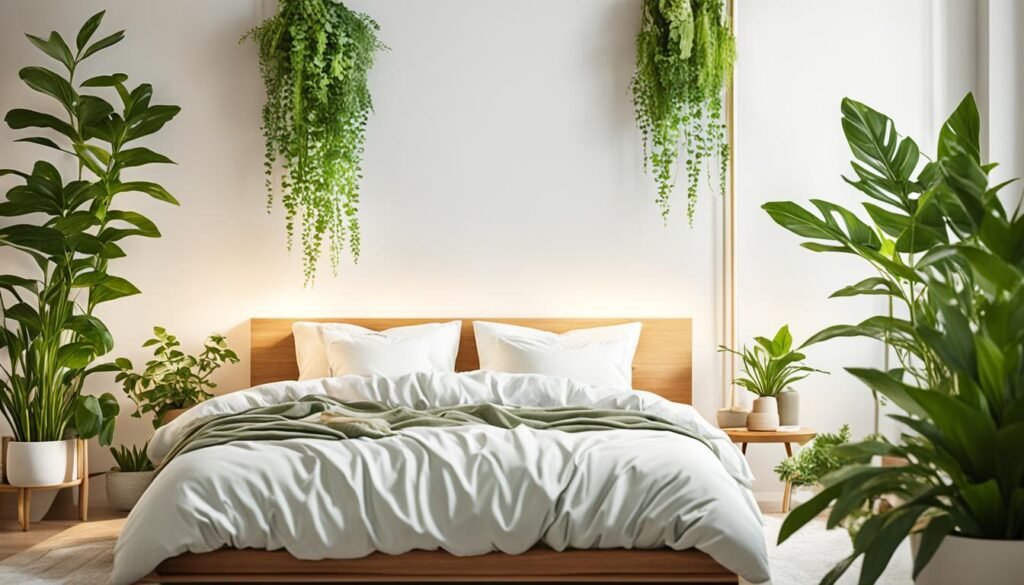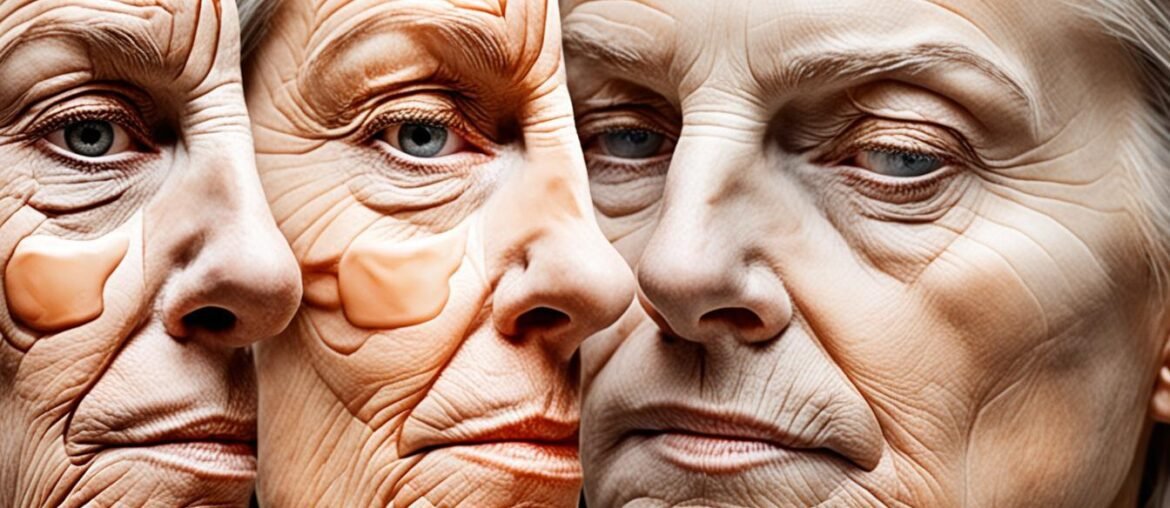Did you know that getting enough sleep can significantly impact the aging process of your skin? It’s true! Sleep plays a crucial role in maintaining skin health and delaying the signs of aging. The quality and duration of your sleep directly affect the health and appearance of your skin.
Key Takeaways:
- Sleep quality is important for maintaining youthful skin and delaying the signs of aging.
- Poor sleep quality has been linked to increased signs of intrinsic aging, such as fine lines and loss of elasticity.
- Adequate sleep promotes skin rejuvenation, repair, and collagen synthesis.
- Poor sleep quality can lead to a weakened skin barrier and slower recovery from environmental stressors.
- By prioritizing quality sleep and adopting a comprehensive approach to skincare, individuals can support healthy skin aging.
The Link Between Sleep Quality and Skin Function
Research has shown that sleep quality has a significant impact on various aspects of skin function. Adequate sleep is essential for promoting skin rejuvenation and repair, allowing the skin to effectively recover from daily damage caused by environmental stressors.
During sleep, the production of growth hormones increases, which plays a vital role in muscle growth, cell rebuilding, and collagen production. These processes contribute to the overall health and vitality of the skin, promoting its ability to regenerate and restore itself.
Sleep also plays a crucial role in enhancing the creation of hormones that help prevent sickness and fight infection, contributing to the overall health and functionality of the skin. Additionally, sleep quality is closely linked to the skin’s ability to retain moisture, promoting proper hydration and optimal skin barrier function.
By prioritizing quality sleep, individuals can support the rejuvenation, repair, and proper function of their skin, ultimately promoting a healthy and youthful complexion.
Effects of Chronic Poor Sleep Quality on Skin Aging

Chronic poor sleep quality can have profound effects on the appearance and aging of the skin. Numerous studies have established a strong correlation between inadequate sleep and accelerated skin aging. Poor sleepers often exhibit visible signs of intrinsic skin aging, including the development of fine lines, uneven pigmentation, and a loss of elasticity.
This detrimental impact on the skin’s appearance is largely attributable to weakened immune function and reduced collagen production. When sleep quality is compromised, the skin’s ability to repair and regenerate itself is hindered. This contributes to increased skin damage and a decline in overall skin health.
One of the key mechanisms through which poor sleep quality affects the skin is by impairing collagen synthesis. Collagen is a crucial protein responsible for maintaining the skin’s firmness and elasticity. During sleep, growth hormone production increases, stimulating collagen formation. However, chronic poor sleep quality disrupts this process, leading to decreased collagen levels in the skin. As a result, the skin becomes more prone to developing wrinkles and fine lines, contributing to premature signs of aging.
Moreover, chronic poor sleep quality also impairs the skin’s ability to recover from environmental stressors. Sleep is a time when the skin repairs damage caused by UV radiation, pollution, and other external factors. Inadequate sleep hampers this recovery process, prolonging the effects of these stressors on the skin and exacerbating skin damage. Over time, this can lead to accelerated skin aging and a diminished overall skin health.
To further understand the effects of poor sleep on skin aging, let’s take a closer look at some of the common signs of aging that can be caused by chronic poor sleep quality:
- Fine lines and wrinkles
- Uneven pigmentation
- Loss of skin elasticity
- Increased skin dryness
- Diminished overall skin health
It is important to note that these signs of aging caused by poor sleep are not just external but also reflect the overall health of the skin. Poor sleep quality compromises the skin’s barrier function, making it more prone to sensitivity, dryness, and increased transepidermal water loss (TEWL). These factors contribute to a compromised skin barrier, which further accelerates the aging process.
In summary, chronic poor sleep quality has undeniable effects on the aging process of the skin, leading to visible signs of aging and diminished skin health. We must prioritize quality sleep as a crucial aspect of skincare, along with other essential practices, to maintain a youthful complexion and delay the signs of aging.
Diminished Skin Barrier Function in Poor Sleepers
Poor sleep quality can have detrimental effects on the skin’s barrier function. Research has shown that individuals with poor sleep habits often experience impaired skin barrier function, leading to various skin issues.
One of the indicators of a weakened skin barrier in poor sleepers is an increased level of transepidermal water loss (TEWL). TEWL refers to the amount of water that evaporates from the skin’s surface, and higher TEWL values indicate a compromised skin barrier.
When the skin’s barrier function is impaired, it becomes more prone to sensitivity, dryness, and damage. Poor sleepers may experience increased skin sensitivity, making their skin more reactive to external irritants and allergens.
Additionally, poor sleep can result in excessive dryness of the skin. A weakened skin barrier struggles to retain moisture, leading to dehydration and potential discomfort.
Furthermore, studies have found that poor sleepers have slower skin barrier recovery after tape stripping compared to individuals who enjoy good sleep quality. This delayed recovery indicates that poor sleep hampers the skin’s ability to repair itself and restore its protective barrier.
Addressing poor sleep habits and prioritizing quality sleep can significantly improve the skin’s barrier function and overall health. By enhancing sleep quality, individuals can promote a healthier and more resilient skin barrier, reducing the risk of skin issues and improving overall skin health.
| Effects of Poor Sleep on Skin Barrier Function |
|---|
| Increased transepidermal water loss (TEWL) |
| Heightened skin sensitivity |
| Dryness and dehydration |
| Slower skin barrier recovery |
Impact of Sleep on Recovery from Environmental Stressors

Adequate sleep is essential for the skin’s ability to recover from environmental stressors, including exposure to UV radiation and other damaging factors. Sleep plays a significant role in the repair and rejuvenation process, allowing the skin to heal and recover from the effects of these stressors.
Poor sleep quality has been associated with slower recovery from skin damage caused by environmental stressors, which can lead to prolonged skin damage and an increased risk of premature aging. When sleep is compromised, the skin’s natural healing mechanisms are disrupted, making it more difficult for the skin to recover and restore its health.
Good sleepers, on the other hand, experience better recovery from erythema (redness) and inflammation caused by sun exposure compared to those with poor sleep quality. Adequate sleep allows the skin to mitigate the harmful effects of sun exposure more effectively, reducing the risk of sunburn and photoaging.
It is important to prioritize quality sleep in order to support the skin’s recovery from environmental stressors and maintain its health. By getting enough sleep and ensuring restful sleep, individuals can help their skin repair, regenerate, and protect against damage caused by external factors.
Self-Perception of Appearance and Sleep Quality
Studies have shown a direct correlation between sleep quality and self-perception of appearance. Good sleepers tend to have a more positive perception of their appearance and physical attractiveness compared to poor sleepers. Chronic poor sleep quality can negatively impact self-esteem and satisfaction with one’s physical appearance, further highlighting the importance of prioritizing quality sleep for maintaining healthy skin and a positive self-image.
Sleep quality plays a vital role in how we perceive ourselves physically. When we consistently experience restful and uninterrupted sleep, we wake up feeling refreshed and rejuvenated. This refreshed feeling can boost our confidence and enhance our overall perception of our appearance.
“When I get a good night’s sleep, I feel like my best self. I notice that my skin looks brighter and healthier, and it gives me a natural glow. It’s like a beauty treatment from the inside out.” – Sarah, a good sleeper.
In contrast, individuals who struggle with chronic poor sleep quality may wake up feeling tired, groggy, and unrested. This can lead to a negative impact on their self-perception of appearance. When we are sleep-deprived, we may notice signs of fatigue in our skin, such as dark circles, dullness, and a lackluster complexion.
Sleep has a profound effect on our physical attractiveness. Inadequate sleep can cause our skin to appear dull, uneven, and aged. On the other hand, prioritizing quality sleep can improve our skin’s radiance, elasticity, and overall health, making us feel more confident and satisfied with our appearance.
The Science Behind Self-Perception and Sleep Quality
Rigorous scientific research has provided insights into the relationship between sleep quality and self-perception of appearance. Studies have shown that sleep deprivation can lead to decreased skin health, increased signs of aging, and a negative impact on physical attractiveness.
- Poor sleep quality is associated with increased levels of stress hormones, such as cortisol, which can contribute to skin inflammation, acne breakouts, and a dull complexion.
- Chronic sleep deprivation affects the body’s ability to regulate blood flow, resulting in reduced oxygen and nutrients reaching the skin cells, leading to a lackluster appearance.
- During sleep, our bodies release growth hormone, which aids in tissue repair, collagen production, and maintaining skin elasticity. Poor sleep quality can disrupt this process, resulting in a decrease in collagen levels and an increase in the appearance of wrinkles and fine lines.
By prioritizing quality sleep, we can provide our bodies with the time and resources they need to repair, rejuvenate, and regenerate. This, in turn, positively influences our self-perception of appearance and overall physical attractiveness.
Quality sleep can not only enhance our physical appearance but also have a significant impact on our mental and emotional well-being. When we feel good about how we look, it boosts our confidence and improves our self-image. Prioritizing sleep is a simple yet effective way to support healthy skin and promote a positive self-perception of appearance.
The Role of Collagen in Skin Aging

Collagen, a vital protein responsible for maintaining skin elasticity and firmness, plays a crucial role in the aging process of the skin. Sleep has a direct impact on collagen production and synthesis, making it an essential factor in maintaining youthful skin.
During sleep, the production of growth hormone increases, which stimulates collagen formation. Adequate sleep ensures optimal collagen levels, promoting skin elasticity and reducing the risk of developing wrinkles and fine lines.
On the other hand, inadequate sleep can disrupt collagen production, leading to decreased skin elasticity and a higher likelihood of premature skin aging.
To preserve youthful skin and promote optimal collagen levels, it is essential to prioritize quality sleep. Investing in a good night’s rest can help maintain a firm and radiant complexion.
Tips for Improving Sleep Quality and Promoting Skin Health

Establishing good sleep hygiene practices is essential for improving sleep quality and promoting skin health. By prioritizing quality sleep, individuals can enhance their overall well-being and support healthy skin aging. Here are some tips to help you improve your sleep quality and take care of your skin:
- Maintain a consistent sleep schedule: Going to bed and waking up at the same time each day helps regulate your body’s internal clock and promotes better sleep quality.
- Create a sleep-friendly environment: Make sure your bedroom is cool, quiet, and dark. Use comfortable bedding and invest in a supportive mattress and pillows to ensure a restful sleep.
- Engage in regular exercise: Regular physical activity can help improve sleep quality. Aim for at least 30 minutes of moderate-intensity exercise most days of the week, but avoid exercising too close to bedtime.
- Establish a relaxing nighttime routine: Wind down before bed by engaging in relaxing activities such as reading a book, taking a warm bath, practicing meditation, or listening to calming music.
- Limit screen time before bed: Avoid using electronic devices, such as smartphones, tablets, and computers, for at least an hour before bed. The blue light emitted by these devices can interfere with your sleep-wake cycle.
- Seek professional help for sleep disorders: If you consistently struggle with sleep problems, such as insomnia or sleep apnea, consult a healthcare professional for proper diagnosis and treatment.
By following these tips and incorporating them into your daily routine, you can improve your sleep quality and promote the health of your skin. Quality sleep is essential for overall well-being and plays a crucial role in maintaining a youthful complexion.
The Role of Sleep in Overall Wellness

Quality sleep is not only essential for skin health but also for overall wellness. Adequate sleep plays a crucial role in various physiological processes, including immune function, hormone regulation, mood stability, and cognitive function. Prioritizing quality sleep is vital for maintaining optimal physical and mental well-being.
“Sleep is the golden chain that ties health and our bodies together.”
– Thomas Dekker
Benefits of Quality Sleep
Getting enough quality sleep on a regular basis offers numerous benefits for our general health:
- Enhanced immune function: Quality sleep supports a robust immune system, reducing the risk of infections and illnesses.
- Hormone regulation: Sleep is crucial for the proper regulation of hormones, including those responsible for appetite control, growth, and stress management.
- Improved mood and mental well-being: Adequate restful sleep promotes emotional stability and mental clarity, reducing the risk of mood disorders and enhancing overall mental well-being.
- Enhanced cognitive function: Quality sleep contributes to improved memory, concentration, problem-solving, and decision-making abilities.
- Increase in energy levels: Restful sleep restores energy levels, allowing for more productive and active daily routines.
- Reduced risk of chronic diseases: Poor sleep quality has been associated with an increased risk of obesity, diabetes, cardiovascular diseases, and compromised immune function.
As we can see, sleep plays a fundamental role in promoting overall wellness and should be considered a priority in our daily lives. By prioritizing quality sleep, we can enjoy the numerous benefits it offers, leading to improved physical, mental, and emotional well-being.
Importance of a Comprehensive Approach to Skin Aging

While sleep quality has a significant impact on skin aging, it is essential to adopt a holistic approach that addresses both internal and external factors contributing to skin aging. By prioritizing a comprehensive skincare regimen, individuals can effectively maintain a youthful complexion and delay the signs of aging.
“A comprehensive approach to skin aging involves considering all aspects of skin health and implementing appropriate measures to support optimal skin function.”
Addressing internal factors is crucial for promoting healthy skin aging. This includes maintaining a balanced diet rich in vitamins, minerals, and antioxidants, which can nourish the skin from within and provide essential nutrients for cellular repair and regeneration. Staying hydrated is also essential for promoting skin health, as adequate hydration helps maintain elasticity and plumpness.
Protecting the skin from external factors is equally important in preventing premature aging. Limiting sun exposure and consistently applying broad-spectrum sunscreen can help shield the skin from harmful UV rays, reducing the risk of sun damage and wrinkles. It is also advisable to avoid smoking and excessive alcohol consumption, as these habits can accelerate the aging process and compromise skin health.
Using skincare products suited to individual skin needs is paramount. Incorporating products with ingredients such as retinol, hyaluronic acid, peptides, and antioxidants can enhance collagen production, improve skin texture, and combat oxidative stress. Additionally, establishing a regular skincare routine that includes cleansing, moisturizing, and exfoliating can promote optimal skin health.
Fruit and Vegetable Antioxidant Chart
| Fruit | Antioxidant Content |
|---|---|
| Blueberries | High |
| Strawberries | Moderate |
| Oranges | Moderate |
| Spinach | High |
| Kale | High |
| Broccoli | Moderate |
A comprehensive approach to skin aging takes into account both internal and external factors. By focusing on a balanced diet, adequate hydration, sun protection, and suitable skincare products, individuals can maximize the benefits of quality sleep and maintain a youthful complexion. Embracing a holistic approach will not only promote healthy skin aging but also contribute to overall well-being.
Conclusion
In conclusion, the impact of sleep on skin health cannot be overstated. Quality sleep is crucial for maintaining a youthful complexion and delaying the aging process. Chronic poor sleep quality has been linked to increased signs of intrinsic aging, such as fine lines and loss of elasticity. Additionally, poor sleep quality can impair the skin’s barrier function, making it more vulnerable to damage.
Adequate and restful sleep, on the other hand, plays a vital role in skin rejuvenation, repair, and collagen synthesis. During sleep, the body produces growth hormones that stimulate collagen formation and promote muscle growth and cell rebuilding. This helps to maintain skin elasticity and firmness.
To support healthy skin aging, it is essential to prioritize quality sleep and adopt a comprehensive approach to skin health. In addition to getting enough restful sleep, individuals should also focus on maintaining a healthy diet, hydration, sun protection, and the use of skincare products suited to their specific needs. By addressing all these factors, individuals can maximize the benefits of sleep and maintain a youthful and radiant complexion.
FAQ
What is the impact of sleep on skin aging?
Sleep plays a crucial role in maintaining skin health and delaying the aging process. It affects various aspects of skin function, including rejuvenation, repair, and collagen production. Chronic poor sleep quality has been associated with increased signs of intrinsic aging, diminished skin barrier function, and lower satisfaction with appearance.
How does sleep quality affect skin function?
Adequate sleep promotes skin rejuvenation and repair, allowing the skin to recover from daily damage caused by environmental stressors. During sleep, growth hormone production increases, aiding in muscle growth, cell rebuilding, and collagen production. Additionally, sleep enhances the creation of hormones that prevent sickness and fight infection, contributing to overall skin health.
What are the effects of chronic poor sleep quality on skin aging?
Multiple studies have found a correlation between chronic poor sleep quality and accelerated skin aging. Poor sleepers often exhibit increased signs of intrinsic skin aging, such as fine lines, uneven pigmentation, and loss of elasticity. These effects are believed to be related to weakened immune function and reduced collagen production, as well as hindered skin recovery from environmental stressors.
How does poor sleep quality impact skin barrier function?
Poor sleepers may experience impaired skin barrier function, as evidenced by higher levels of transepidermal water loss (TEWL) and slower recovery after skin damage. This can result in increased sensitivity, dryness, and a higher risk of skin damage.
What is the impact of sleep on recovery from environmental stressors?
Adequate sleep plays a crucial role in the skin’s ability to recover from environmental stressors such as UV radiation. Good sleepers have been found to have better recovery from erythema and inflammation caused by sun exposure compared to poor sleepers. Additionally, poor sleep quality can hinder the skin’s recovery from stress-induced damage, leading to prolonged skin damage and a higher risk of premature aging.
How does sleep quality affect self-perception of appearance?
Studies have shown a direct correlation between sleep quality and self-perception of appearance. Good sleepers tend to have a more positive perception of their appearance and physical attractiveness compared to poor sleepers. Chronic poor sleep quality can negatively impact self-esteem and satisfaction with one’s physical appearance.
What is the role of collagen in skin aging and how does sleep impact its production?
Collagen is a vital protein for maintaining skin elasticity and firmness. Sleep plays a pivotal role in collagen synthesis, as growth hormone production increases during sleep, stimulating collagen formation. Inadequate sleep can disrupt collagen production, leading to decreased skin elasticity and an increased risk of developing wrinkles and fine lines.
What are some tips for improving sleep quality and promoting skin health?
To improve sleep quality and promote skin health, it is important to establish good sleep hygiene practices. These include maintaining a consistent sleep schedule, creating a sleep-friendly environment, engaging in regular exercise, establishing a relaxing nighttime routine, limiting screen time before bed, and seeking professional help for sleep disorders if necessary.
What is the role of sleep in overall wellness?
Quality sleep is not only essential for skin health but also for overall wellness. Adequate sleep plays a crucial role in various physiological processes, including immune function, hormone regulation, mood stability, and cognitive function. Poor sleep quality has been associated with an increased risk of numerous health conditions, emphasizing the importance of prioritizing quality sleep for optimal physical and mental well-being.
Why is a comprehensive approach important for skin aging?
While sleep quality has a significant impact on skin aging, it is essential to adopt a comprehensive approach to address other internal and external factors that contribute to skin aging. This includes maintaining a healthy diet, staying hydrated, protecting the skin from sun damage, avoiding smoking and excessive alcohol consumption, and using skincare products suited to individual skin needs.




